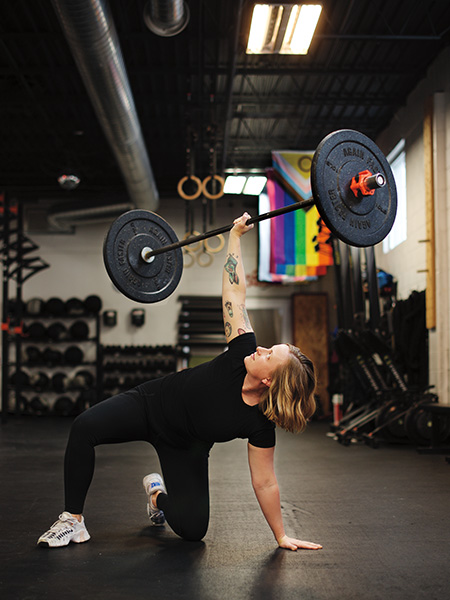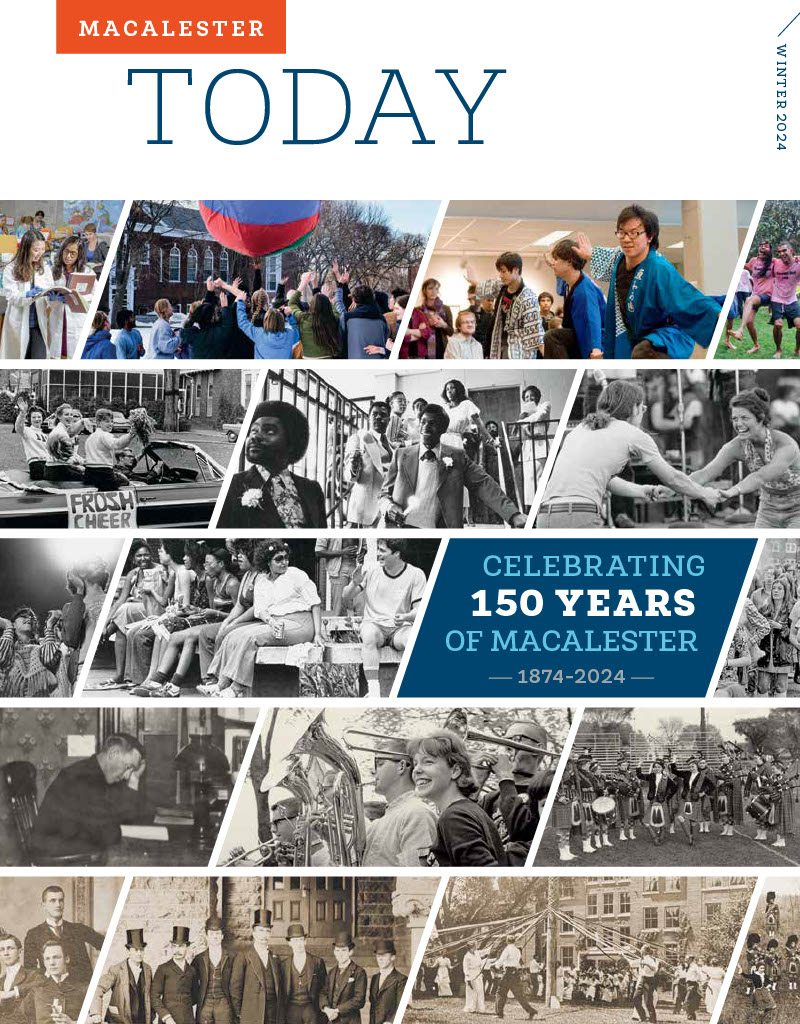
By Rebecca DeJarlais Ortiz ’06 / Photo by K Ho
On a rainy fall morning in Minneapolis, the energy inside Solcana Fitness contrasts sharply with the dreary weather: A strength class is finishing up in the main studio space, with music pulsing over the speakers as the instructor cues the final sets. The mood is fun, even joyful, as people cheer on one another, clapping and smiling during a tough workout.
But the upbeat atmosphere coexists with a serious purpose. Solcana, owned by Hannah Wydeven ’09, is a fitness center that deliberately welcomes all: BIPOC, queer and trans people, those with bigger bodies and disabilities, and anyone who might not feel comfortable in a traditional gym environment.

Wydeven found her way into the fitness space after graduation, when she was searching for community and the values-driven work she was drawn to at Macalester. She joined a CrossFit gym to make friends, not to discover a career path. That changed when she started coaching. “All of these people were coming in with baggage about their bodies and abilities,” Wydeven says. “I started to realize that I could help people shift their mindset and see themselves as more than just the way they look.”
Before long, she was coaching more, and pitching programs that fostered community both in the gym and the surrounding neighborhood: a women’s-only class, free classes for kids, school partnerships. With financial support from a client, she decided to branch out on her own, and she opened Solcana in 2014.
Wydeven’s initial goal was to establish a feminist CrossFit environment that pushed back against a type of exclusionary “bro” culture that can make women and other people who don’t fit into that mold feel unwelcome. Over time, though, her vision started to grow its own identity, becoming with each step more inclusive. Some of that happened through Wydeven’s reflection about her own identity. “I’ve always been so drawn to developing opportunities for women and queer people, but I didn’t really know why,” she says. “Part of our evolution is me realizing, ‘Oh. Oops, I’m queer— that’s why.’ We were offering this space, and the people who came were so fully themselves. That gave me the opportunity to fully be myself, too.”
Solcana’s culture also has developed through feedback and ideas from its members. For example, client input prompted Wydeven to shift workouts away from CrossFit’s rigid assessment metrics, add a scholarship program, and create programming for trans people. “I’ll never forget the first client who said, ‘I’m a trans person,’” she says. “I said, ‘Awesome. Are you comfortable telling me literally everything that would help you feel better here?’ And they were. They opened the door for our trans strength programs, which have become a huge part of our community.”
After six years of her gym’s steady growth, Wydeven faced a turning point in 2020, even before the COVID-19 pandemic. Navigating postpartum anxiety and depression after the birth of her first child, she returned to work with major business challenges suddenly looming. “I knew how much money we needed to break even, but essentially, I had been relying on vibes,” she says. “I had to learn that for us to really do impactful work, we have to be very business-minded, with strong systems and decisive leadership, and we need our team to be rested. Until that point, I was just burning myself in the fire every day, and all of a sudden, it wasn’t sustainable.”
Then the pandemic surged, and Solcana shut down for several months. Wydeven hired a business coach and started to implement changes, and the gym’s financial picture began to improve. In the aftermath of George Floyd’s murder, less than a mile away from Solcana, she formed a coalition with eight other gym owners who wanted to implement stronger racial justice commitments. They met weekly with equity consultants, who identified opportunities for improvement including making hiring practices more equitable and understanding how members of color might be interacting with Solcana’s space. Wydeven also asked then-CrossFit CEO Greg Glassman to take a stand against systemic racism, then joined other gym owners in disaffiliating from CrossFit following public outcry around Glassman’s comments on Floyd’s murder, the resulting demonstrations, and the pandemic.
Today, Wydeven continues to advocate for more inclusive and equitable gym cultures, sharing advice when other gym owners ask for it. And Solcana continues to grow: at full capacity with 330 members (and more wait-listed), the 3,800 square-foot gym is starting to feel cramped. As Wydeven works on securing a larger space, her team is figuring out how to expand without sacrificing Solcana’s close-knit community. One immediate goal is promoting an inclusive coach training series that she and her general manager created. It’s designed to equip coaches with the skills and care to support people with a wide range of identities, body types, and needs.
As her business evolves, Wydeven has noticed she’s no longer the gym’s main character. In the fitness class on that rainy morning, she’s part of the group working out, not standing out among the participants. These days, not everybody knows she’s the owner—and that’s what she wants. “I can’t be the person here at all times,” she says. “I don’t want people to feel like this place is just me and my little tornado of ideas. There’s a whole team, and we’re not interchangeable, but we do all have the same ethos, and we’re driven by the same mission. That’s the dream, and it’s happening now.”
Rebecca DeJarlais Ortiz ’06 is the director of strategic communication at Macalester.
February 5 2024
Back to top





